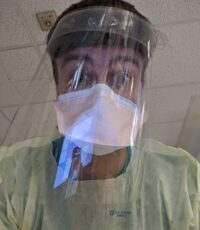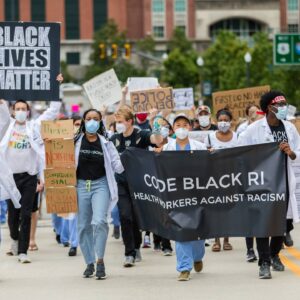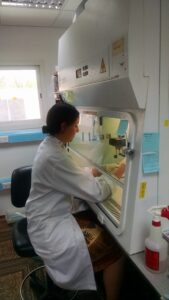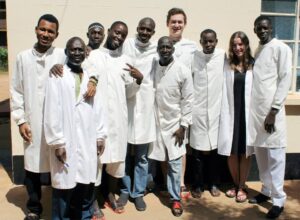May/June 2020
Dear Friends,
PiAf Connections
Please click below to check out pictures of our Fellows, Alums and other members of the PiAf family meeting up at home and around Africa.
Notes from the Field
By Thomas “Fritz” Siegert M.D., a second-year resident in internal medicine and pediatrics at the Warren Alpert Medical School of Brown University.

Fritz in his COVID-era work outfit in the ICU
The phone calls get to you.
Working as a resident-physician in a COVID-19 ICU, you sense the physical distance felt by families from their loved ones. Until recently, with safety in mind, the health system I work at did not allow family members to visit hospitalized patients under almost any circumstance.
So, phone calls are important.
The best phone calls are when you get a “Thank God” or “I’m so glad” after telling a family member that their loved one is doing well, “we’ve taken them off the vent” or “they were able to eat by mouth today.” Unfortunately, working in a state that available data suggests has one of the highest COVID-19 mortality rates in the country, I often made different phone calls. One time, I told two grown children that their mother had died in the early morning of Mother’s Day.

A CODE BLACK RI protest in Providence, RI highlighting racism as a public health crisis organized in part by Fritz’s brilliant co-residents: Drs. Yvorn “Doc” Aswad (right, holding banner) and Vanessa Ogueri (center-left), and medical student Angela Zhang (center, holding banner).
That, among other phone calls, impressed upon me the distance created by this current pandemic.
Distance like the socioeconomic and cultural distance between my patients and me, a white, straight, cis-gendered, able-bodied, highly educated man from an upper middle class background. I think about the disproportionate burden this pandemic has placed on black and brown people, American Indian/Alaska Native peoples, people experiencing homelessness, and our senior community living in nursing homes and long-term care facilities.
My PiAf experience helped build the skillset I rely on to do the work to overcome those distances in my patient-doctor relationships. My PiAf experience also shaped the framework through which I, as a physician, recognize the perpetuated inequities in our healthcare system.
Since my PiAf fellowship, I have lived, trained, and worked across the U.S. Pacific Northwest, Kenya, Uganda, and now Rhode Island. I have had the privilege of witnessing first-hand the intersection between working towards greater health equity in East Africa and here in the U.S. Towards that mutual aim, I continue to learn and draw inspiration from our greater PiAf Community.
We are living through a global public health crisis, not even a year in the making. We are also living through a recently exacerbated global public health crisis of racism, millennia in the making. I strongly believe the collective talents of our PiAf community are useful in addressing both.
Fritz was a 2013-14 Fellow with Maru-a-Pula in Botswana
Notes from the Field
By Morgan Goheen M.D., an Internal Medicine Resident Physician at Yale-New Haven Hospital

Morgan at her lab at Yale-New Haven.
There is something truly wearying about donning and doffing PPE endlessly throughout the day. Wearing an N95 respirator for hours, your head and ears hurt. Plastering a surgical mask to your nose tight enough to ensure your glasses don’t fog up, putting on the gowns, face shields and gloves in the right order while trying to remember the current hospital policy about what gets recycled and what can be worn between rooms – it’s tiring. The worst is getting an urgent response call and trying to go through the entire process in rapid time. Yet, this is normal life as a physician these days. And I hardly have reason to complain, maintaining my health and my job in the midst of a pandemic that has so profoundly reshaped life across the globe.
It has been many years since my PiAf fellowship in 2009-2010, working at mothers2mothers on Prevention of Mother-to-Child Transmission of HIV in Sub-Saharan Africa. It was an incredibly eye-opening and formative year for me, introducing someone with a background in microbial pathogenesis and molecular biology bench research to public health aspects of combating infectious diseases. I gained immeasurable perspective and insight into the social impacts of infectious disease spread, particularly in resource poor settings, as well as learned about funding and policy-making bodies meant to address such issues – a far cry from the pipettes and cell culture models I was used to. My experiences from that year have stayed with me and shaped my career goals going forward, as I hope to operate at the confluence of infectious disease research, medical practice, and policy formation.
After my PiAf year, I moved on to start my MD/PhD training at the University of North Carolina at Chapel Hill. My PhD was in Microbiology and Immunology and my project involved studying the cellular relationship between malaria susceptibility and host iron status, specifically the protective benefits of iron deficiency and the risks of iron supplementation. Much of my time involved field-based laboratory research, for which I lived in rural Gambia for over two years. The Gambia truly became a home away from home and my experiences there solidified my longstanding career goal to pursue infectious disease research in a global health context.

Morgan with her team in The Gambia
It has taken many years to continue inching my way towards this goal. One year ago, I started my Internal Medicine residency at Yale, part of the Physician Scientist Training Program, whereby I will “fast-track” into an Infectious Disease fellowship here in another year’s time, and I’m also participating in our Global Health and Equity track during residency. The foundation of these infectious disease career plans were laid down over a decade ago, well before “The Time of Covid,” as I now here our current crisis referred to around the hospital. Yet suddenly, and strangely, everything I’ve been working for has become more globally relevant and in the forefront of nearly everyone’s minds over the past few months.
At its peak Yale New Haven Hospital hosted >450 Covid patients, nearly 25% of which required ICU level care. This required an entire restricting of our residency program in order to cover the seemingly endless Covid cases and the expanded ICU. My life over the past few months has literally been all Covid, all the time. Somewhere along the way, I developed Covid antibodies (though thankfully never had symptoms), and have known coworkers who were incapacitated at home for weeks with significant disease. It’s bizarre to have Covid take over my existence and yet realize many people throughout the country still barely believe the pandemic is real.
We obviously have a lot of work to do from here. We have to confront the need to rebuild trust in scientific data and expertise, and we have to address social and racial disparities and injustices which have appropriately been drawn to the forefront of our country’s mindset. Nearly certainly, we will have more waves of infection to confront, with currently very little to offer in terms of definitive therapies. Looking ahead to the shape of the growing pandemic in Africa, we will have a lot of work to do in trying to mitigate spread and offer treatment in diverse settings, many of which include areas where social distancing is impossible, there is significant distrust of government/institutions, and very little resources exist for medical treatment. What exactly will further spread look like in Africa? Has the continent largely evaded the worst of it, or is only a matter of time before it hits harder? No one knows.
The days are long, the PPE irritating, the overall outlook often bleak. But I’ll keep doing my part, as I know many other members of the PiAf community will as well. Wherever this uncertain future leads us, I hope PiAf can continue to educate and build the next generation of young professionals dedicated to careers with global purpose. The planet and humanity truly needs us to operate together now more than ever.
Morgan was a 2009-10 Fellow with mothers2mothers in South Africa.
Notes from the Field
Princeton in Africa Black Lives Matter Statement
Princeton in Africa unequivocally condemns racism, neocolonialism, and white supremacy in all its forms. We believe that Black Lives Matter and we stand in solidarity with all those seeking to amplify the voices of disenfranchised communities in the US and around the globe. We also continue to strive to develop young leaders who not only hold these values, but demonstrate them throughout their professional careers. As such, we would like to reconfirm our commitment to continue:
- Diversifying our fellowship classes
- Seeking funds to ensure equity of the fellowship experience
- Examining and addressing specific fellowship challenges faced by Black Fellows and alumni
- Developing new resources for our staff and board
- Creating new curriculum around privilege and positionality for our orientation and retreat
- Working alongside our alumni board members to identify and enact change
- Creating transparent dialogue between our Fellows, alumni and staff
- Amplifying the work of our host organizations who stand on the frontlines of economic and social justice, movements in the right to health and education and all forms of human dignity.
We recognize that stating goals and realizing them can be two separate matters. Knowing that there are times that we have fallen short on these goals, we have mobilized an Anti-Racism Committee. This committee, made up of board and alumni, will take a closer look at Princeton in Africa’s policies and practices and will put in place a list of actionable items to ensure that we have integrated equity of experience in all levels of our institution.



